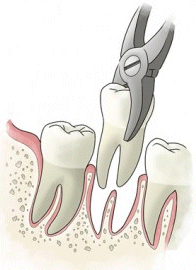
What is Tooth Extraction?
Tooth extraction (or having a 'tooth pulled') is a common dental procedure that involves the removal of a tooth from its socket in the jaw bone. A tooth extraction is performed in order to remove seriously damaged teeth (with excessive tooth decay, abscessed teeth, fractured or broken teeth), as a measure to prevent more serious dental problems (impacted teeth, tooth infections), or as a preparation for braces or a complete denture.
About Tooth Extractions
The tooth extraction procedure may be a simple extraction or a surgical extraction. A simple extraction removes a tooth that has erupted into the mouth without cutting into the gum. A surgical extraction removes a tooth through incision of the gum and possibly the jawbone.
If the extraction is expected to be more complicated than a simple extraction, a general dentist may refer the patient to an oral surgeon. Oral surgeons are specialists in performing surgical extractions such as impacted wisdom teeth extractions.
The level of complexity depends on the position and condition of the tooth to be extracted. The front or top teeth are usually easier to extract than the back or lower ones. Sideways tilted impacted teeth are more difficult to extract that those in a normal position.
When tooth extraction is necessary?
Some years ago, tooth extraction was the recommended solution for many dental conditions. In our days, modern dentistry targets to the prevention of tooth loss. Keeping your natural teeth as long as possible is the best choice. A dentist will always recommend and try all other alternative treatments to save a tooth, before deciding to proceed to a tooth extraction.
However, in some cases a tooth extraction is necessary. The reasons why a dentist might recommend one or more tooth extractions include the following :
1. A tooth extraction might be indicated if repairing a damaged tooth is not practical, in case of :
- Severe Tooth Decay. If a tooth is so badly damaged by tooth decay , that the dentist is unable to restore it using a filling, crown or other treatment, the tooth has to be extracted. Dental caries is the main reason for teeth extractions.
- Periodontal disease. Deep periodontal pockets and extensive loss of jawbone and gum tissues because of periodontal disease, result in a loose non viable tooth and to tooth extraction. Tooth extraction due to bone loss caused by periodontal disease is the most frequent cause of tooth extractions for people over 40 years of age.
- Tooth abscess / Failed Root Canal. An infected or abscessed tooth requires a root canal treatment to stop the infection. A small percentage (5%) of root canal treatments fail and a tooth extraction may be needed.
- Fractured / cracked teeth or roots. A severe fracture on a tooth’s crown that can not be treated with root canal treatment, or a fractured root that can not be treated by apicoectomy are also reasons for a small part of tooth extractions.
- Impacted teeth / Wisdom teeth. Impacted are called the teeth that do not erupt properly to their normal position or they do not erupt at all above the gums. Pericoronitis is a painful condition caused by impacted teeth. Wisdom teeth have the highest possibility to become impacted. But even if not impacted, wisdom teeth are a frequent source of dental problems because of the difficulty to clean them properly. Some dentists suggest the preventive wisdom teeth extraction, before they cause any problems.
2. Healthy teeth may also be subject of tooth extraction for reasons like :
- Orthodontic treatment. Teeth crowding is a common cause of crooked teeth that require orthodontic treatment. Some teeth may have to be extracted before placing braces in order to create space for the rest of the teeth to move into a straighter position. Malpositioned or non-functional teeth may need to be extracted. Teeth extractions for braces are common in teens.
- Malpositioned teeth in children, primary or permanent, that block other teeth from erupting properly.
- Preparation for a complete denture. If a person’s remaining teeth are not strong enough to support a partial denture, a full denture is the only alternative. The teeth have to be removed by tooth extraction.
3. Other non dental related reasons include :
- Economic reasons. Unfortunately it is not easy for everybody to afford the cost of a root canal, periodontal or other treatment that is needed to save a tooth. So, they have to choose the tooth extraction as the least expensive ‘treatment’.
- Radiation therapy. Head and neck cancer patients may need to have some teeth extracted, as they could be obstacles to radiation delivery at the treatment area.
- Risk of infection. Any teeth with a high risk of infection may need to be extracted before any therapy that weakens the immune system (e.g., chemotherapy, immunosuppression for organ transplant) in order to prevent complications.
![]() The cost of replacing extracted teeth can be significant and many patients may not afford it if they are not covered by their dental insurance.
Learn how to choose a dental insurance plan that will provide the best dental treatment to you and your family.
The cost of replacing extracted teeth can be significant and many patients may not afford it if they are not covered by their dental insurance.
Learn how to choose a dental insurance plan that will provide the best dental treatment to you and your family.


